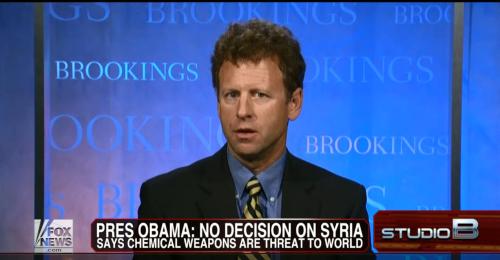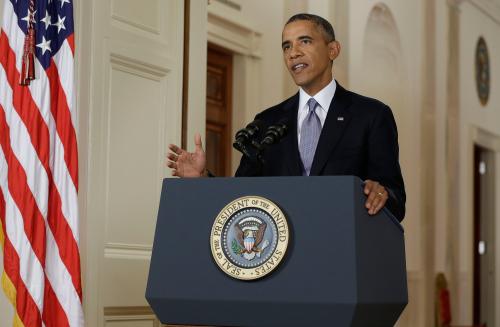Will Congress authorize President Obama to employ U.S. forces to strike Syria over the Assad regime’s suspected chemical weapons use? Should the U.S. take military action at all, and if so, how and what are the ramifications for that country, the region and President Obama’s standing? Experts from across the Brookings Institution have been analyzing the issues. A brief roundup follows. Note that on Thursday, September 5, Brookings experts will discuss these issues in a public event.
Steve Pifer, dissecting President Obama’s approach, says this is “no way to start a war”:
Recovering presidential credibility will not be easy. … By waiting until Congress returns on September 9, the president has undercut the political momentum for action his administration had built during the week of August 26 and gives opponents time to mobilize their numbers. He will need to do some hands-on lobbying, but he is scheduled to spend most of the week in Sweden and St Petersburg, Russia.
Michael O’Hanlon says Assad would get the message of an American attack, and so would Iran:
The actual military target set, frankly, is almost secondary. … It’s more the indication, the message that you could do even more if necessary that ideally restores deterrence so that he doesn’t do this again and so that the rulers in Iran don’t get the idea over there that they can pursue nuclear weapons with impunity against Mr. Obama’s red line on that weapons of mass destruction issue.
Michael Doran says regime change is the only solution:
The only route to a political solution in Syria is regime change. … The United States should work as aggressively as possible to build up the Free Syrian Army, even if it cannot commit the resources necessary to bring Assad down directly.
Bruce Riedel tackles the problem of the element of al Qaeda’s presence in the Syrian opposition:
The United States wants to find some way to strike Assad that does not benefit the most dangerous elements of the Syrian opposition — the al-Qaeda franchises that have become increasingly important in the Syrian civil war. One way is to better use information warfare against the al-Qaeda menace.
Bessma Momani reflects that there are just no good answers for what may be “a terminal case”:
No outside force has a right to tell the Syrian people that some will be sacrificed to save the future of Syria. No Syrian has the legitimacy to sacrifice one neighbour to save the other. There is an inherent moral dilemma that has no ethical, just or right answer. Which is why while Syria’s sickness may not be incurable, it is getting easier and easier to diagnose it as a terminal case.
Bill Galston reviews the bi-partisan history of use-of-force decision-making in Congress:
President Obama’s surprising decision to seek congressional authorization for a strike on Syria has set off an historically resonant debate in both political parties, the outcome of which will affect American politics and policy for years to come. … A generation ago, the country struggled with the legacy of Vietnam and paid a price as it did. We will soon find out whether today’s Iraq syndrome is as potent as the Vietnam syndrome of the 1970s and, if so, what price this generation of Americans will pay for it.
Sarah Binder anticipates how Congress may vote, based on historical data:
The central question will be whether Obama is able to muster majorities in both chambers or whether the votes will devolve into familiar partisan lines (producing a narrow win in the Senate but failing in the House): Will members of Congress treat a military attack differently? … Voting on a punitive strike against Syria might ultimately reflect party calculations, but other motivations may yet be in play.
Visit the Syria research page for all of the recent research and commentary from Brookings experts.
The Brookings Institution is committed to quality, independence, and impact.
We are supported by a diverse array of funders. In line with our values and policies, each Brookings publication represents the sole views of its author(s).











Commentary
Recommendations for an Approach to Syria
September 4, 2013